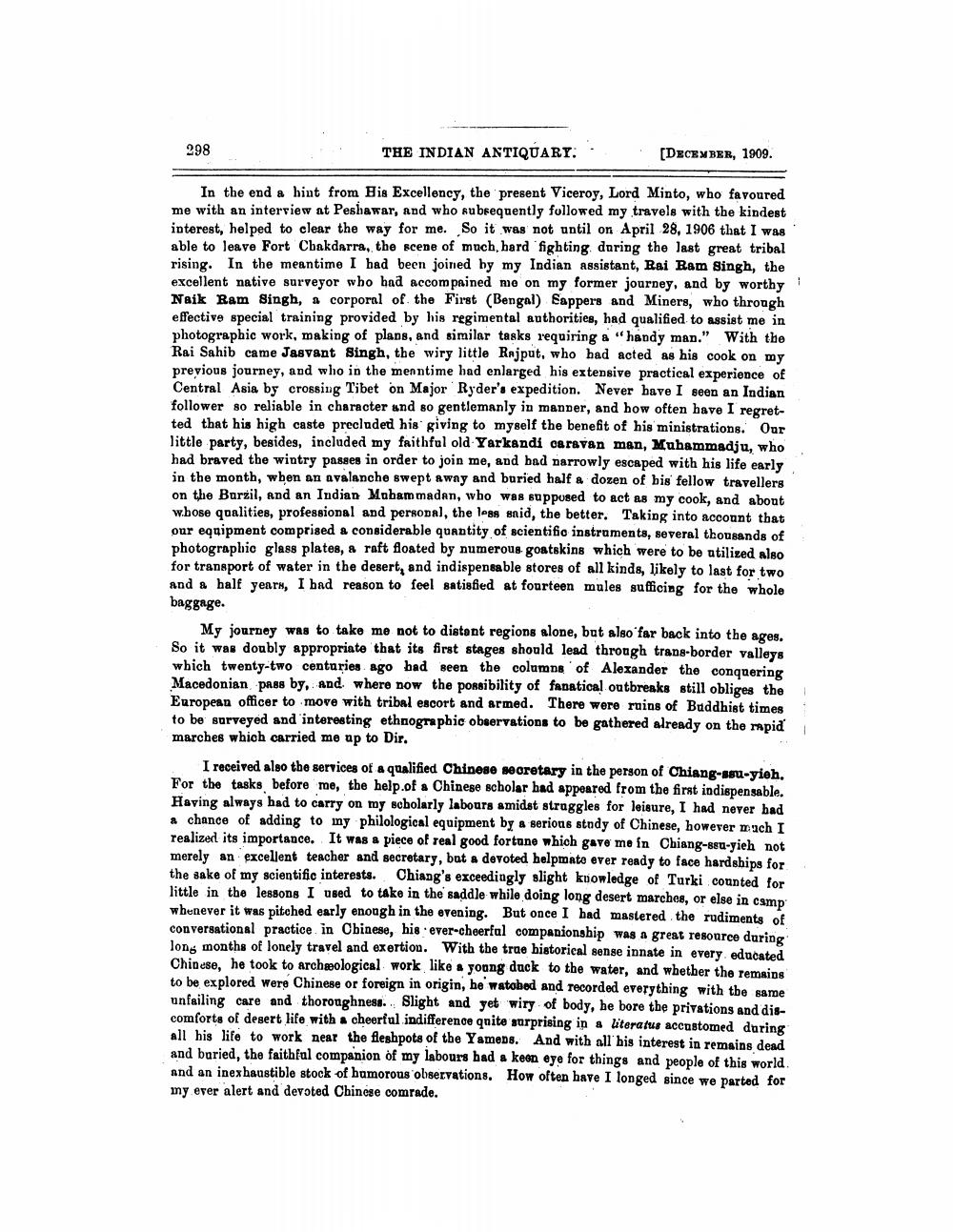________________
298
THE INDIAN ANTIQUARI. -
[DECEMBER, 1909.
In the end a hint from His Excellency, the present Viceroy, Lord Minto, who favoured me with an interview at Peshawar, and who subsequently followed my travels with the kindest interest, helped to clear the way for me. So it was not until on April 28, 1906 that I was able to leave Fort Chakdarra, the scene of much, bard fighting during the last great tribal rising. In the meantime I had been joined by my Indian Assistant, Rai Ram Singh, the excellent native surveyor who had accompained me on my former journey, and by worthy Naik Ram Singh, a corporal of the First (Bengal) Eappers and Miners, who through effective special training provided by his regimental authorities, had qualified to assist me in photographic work, making of plans, and similar tasks requiring a "handy man." With the Rai Sahib came Jasvant Singh, the wiry little Rajput, who had acted as his cook on my previous journey, and who in the menntime had enlarged his extensive practical experience of Central Asia by crossing Tibet on Major Ryder's expedition. Never have I seen an Indian follower so reliable in character and so gentlemanly in manner, and how often have I regretted that his high caste precluded his giving to myself the benefit of his ministrations. Our little party, besides, included my frithful old Yarkandi caravan man, Muhammadju, who had braved the wintry passes in order to join me, and bad narrowly escaped with his life early in the month, when an avalanche swept away and buried half a dozen of bis fellow travellers on the Barzil, and an Indian Muhammadan, who was supposed to act as my cook, and about w.hose qualities, professional and personal, the less snid, the better. Taking into account that our equipment comprised a considerable quantity of scientific instruments, several thousands of photographic glass plates, & raft floated by numerous goatskins which were to be utilized also for transport of water in the desert, and indispensable stores of all kinds, likely to last for two and a half years, I had reason to feel satisfied at fourteen mules sufficing for the whole baggage.
My journey was to take me not to distant regions alone, but also far back into the ages. So it was doubly appropriate that its first stages should lead through trans-border valleys which twenty-two centuries ago had seen the columns of Alexander the conqnering Macedonian pass by, and where now the possibility of fanatical outbreaks still obliges the European officer to move with tribal escort and armed. There were ruins of Buddhist times to be surveyed and interesting ethnographic observations to be gathered already on the rapid marches which carried me up to Dir.
I received also the services of a qualified Chinese secretary in the person of Chiang-su-gioh. For the tasks before me, the help.of a Chinese scholar bad appeared from the first indispensable. Having always had to carry on my scholarly labours amidst struggles for leisure, I had never bad a chance of adding to my philological equipment by a serious stndy of Chinese, however much I realized its importance. It was a piece of real good fortune which gave me in Chiang-s8u-yieh not merely an excellent teacher and secretary, but a devoted helpmate ever ready to face hardships for the sake of my scientific interests. Chiang's exceedingly slight kuowledge of Turki counted for little in the lessons I used to take in the saddle while doing long desert marches, or else in camp whenever it was pitched early enough in the evening. But once I bad mastered the rudiments of conversational practice in Chinese, his ever-cheerful companionship was a great resource during lony months of lonely travel and exertion. With the trae bistorical sense innate in every educated Chinese, he took to archeological work like a young duck to the water, and whether the remains to be explored Were Chinese or foreign in origin, he watobed and recorded everything with the same unfailing care and thoroughness.. Slight and yet wiry of body, he bore the privations and discomforts of desert life with a cheerful indifference quite surprising in a literatus accustomed during all his life to work near the fleshpots of the Yamens. And with all' bis interest in remains dead and buried, the faithful companion of my labours had a keen eye for things and people of this world and an inexhaustible stock of humorous observations. How often have I longed since we parted for my ever alert and devoted Chinese comrade.




